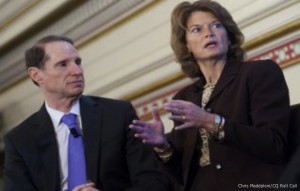
Event Review: Realizing the Potential of U.S. Unconventional Natural Gas
 On February 13, 2013 the Center for Strategic and International Studies (CSIS) hosted an event entitled “Realizing the Potential of U.S. Unconventional Natural Gas.” Headlining the event were two members of the Senate Energy and Natural Resources Committee: Senator Ron Wyden (D-Oregon), and Senator Lisa Murkowski (R-Alaska).
On February 13, 2013 the Center for Strategic and International Studies (CSIS) hosted an event entitled “Realizing the Potential of U.S. Unconventional Natural Gas.” Headlining the event were two members of the Senate Energy and Natural Resources Committee: Senator Ron Wyden (D-Oregon), and Senator Lisa Murkowski (R-Alaska).
Sen. Murkowski opened by saying that it is important for greater bipartisan consensus to occur in U.S. Congress, and that there is a strong desire to create an energy framework in the Energy Committee. She used her Energy 20/20 blueprint as an example of the progress being made in this respect. She noted that the U.S. has access to abundant resources, including shale gas and renewable energy. She also stressed that it is important to have an energy discussion focusing on how the U.S. as a whole can produce cleaner, diverse, and more secure energy.
Sen. Wyden said that times have certainly changed regarding the U.S. energy industry. The energy debate used to revolved around the foreign sources we were dependent upon; today, the U.S has discovered an abundance of energy which can help to spur economic growth, lower the trade deficit, and promote a cleaner environment. He said he was committed to finding a ‘sweet spot’ on natural gas, which included how to export natural gas without driving up its price. Renewable energy, like geothermal, hydro, and biomass, has an important role to play in the energy debate. He also expressed optimism in finding common ground as to the role that natural gas can play in the U.S. energy debate.
Both Sen. Murkowski and Sen. Wyden gave further insight on their views on natural gas in a Question and Answer session following their statements. Sen. Murkowski expressed her belief that it is more important to fund research and development for renewable energy than to dole out federal subsidies. She said that Alaska is focusing on exporting to new markets, but noted that it is enormously expensive to build liquefied natural gas (LNG) export terminals. Sen. Wyden said that there could be a market-based solution to the question of exporting natural gas: if world demand is not high, then prices might stay relatively low. He also said that hydraulic fracturing (fracking) programs need to ensure disclosure, as communities need to be made aware of the potential dangers of fracking.
The CSIS event had a panel of speakers to discuss some of the key aspects of U.S. natural gas following the presentations of Sens. Murkowski and Wyden. Mr. Clay Bretches of Anadarko said that the resource base of natural gas is enormous, and that fracking has the potential to increase jobs in the millions. Anadarko is focused on technological innovation to decrease environmental hazards of fracking, including single pad drilling and close loop drilling systems. Mr. Michael B. Hosford of GE Oil and Gas said that GE is focused on risk management in fracking, and involving renewable energy in their projects.
Mr. Fred Krupp of the Environmental Defense Fund served as the voice of caution in the debate over U.S. natural gas. He stressed that shale gas has obvious benefits, but the risks in acquiring it are only “potentially manageable.” Some of the risks of fracking, he noted, include water and air pollution, methane leaks, and the issue of disclosure. The challenges in natural gas include safety and development, fugitive emissions, and upgrading the electrical grid system that natural gas can help power. He also said that while natural gas may be part of the problem with regard to emissions, it is more environmentally friendly than coal.
Climate and energy concerns were issues highlighted in the President’s recent State of the Union address, so many at the event were glad to see the debate being continued by CSIS and its panelists. Natural gas can play an important role as the U.S. looks to increase its energy efficiency and it can also help bridge the gap as more forms of renewable energy are being developed. With Sen. Wyden and Sen. Murkowski taking the lead, there is a sense of optimism that a bipartisan agreement on natural gas can be reached.
For a link to the publication of the CSIS Executive Summary of their report entitled “Realizing the Potential of U.S. Unconventional Natural Gas,” click here.







[…] Event Review: Realizing the Potential of U.S. Unconventional Natural Gas […]